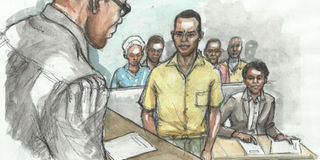Kiruhura District murders: A trial within a trial part 2

Six people were killed in a homestead in Kiruhura District on the night of Friday, August 16, 2013. Six people were arraigned in court and charged with the murder.
In the course of trial, court conducted a trial with a trial, when the defense lawyer objected to tendering in as evidence the charge and caution recorded from Asiimwe James, one of the accused persons.
The lawyer’s objection was that the statement was not obtained voluntarily after Asiimwe testified that he was tortured and coerced.
The state, however, refuted these allegations and submitted that proper procedure was used to record the statement. The state also mentioned that the doctor who examined the accused person did not find any evidence of torture.
Asiimwe’s lawyer, in his submission, stated that the defense was not contesting the fact that the procedure of recording a charge and caution statement was followed.
Indeed court considered the procedure that was followed in recording the statement and found that it was proper and did not cause any failure of justice to Asiimwe.
The remaining issue was whether the statement was voluntarily made. Asiimwe told court that he was coerced into signing the statement.
He also told court that the state promised to buy him a house in Kampala, if he cooperated and implicated his co-accused in the commission of the crime.
He further testified that he declined the offer because he did not know some of persons accused of the offense and that no house was ever bought for him.
Court ruled that the accused person could therefore have not been coerced into signing the statement by an offer he had rejected, an offer made after he had signed the statement.
Asiimwe further told court that the police chief himself visited him while he was on remand and in the presence of two other people, gave him Shs500,000 to implicate his co-accused in the commission of the crime.
Court, however, noted that Asiimwe in his evidence told court that he was made to sign the statement while in police custody, before he was taken to court to be charged and remanded. Court therefore ruled that the police chief’s gift was not relevant to the statement.
Asiimwe told court that he signed the statement in a state of fear. His lawyers attributed the state of fear to the physical and psychological torture, which Asiimwe suffered at the hands of the agents of the state.
Asiimwe told court that he was arrested by men armed with guns, driven to Kampala, the night he was made to share a cell with a dead body.
He told court he was beaten several times while in Kampala and driven to Kiruhura and back to Kampala in the car boot. While in Kiruhura, he was handcuffed and also chained in the legs and one of the investigating officers slapped him hard in the face.
He also told court that while in Kampala, he was moved to various police stations and sometimes detained in ungazetted places.
His lawyer submitted to court that the acts of moving his client at night to various places he had never been to and making him spend a night in a room with a dead body were aimed at torturing him psychologically and compel him to do anything asked of him by the police. The lawyer, was content that his client did not sign the statement on September 8, 2013 voluntarily, but did so as a result of both the physical and psychological torture.
Asiimwe showed court the numerous scars marks on his body. The judge noted that such scars, if not carefully observed, could not be easily noticed.
To court, these scars pointed to some form of torture. (Authors note; these scars were shown to court two years after the period in question).
Court was also satisfied that being made to sleep with a dead body in the same room and being driven in a car boot from Kampala to Kiruhura and back, could have negative psychological effects on the victim.
However, court was of the opinion that the test of admissibility of a statement is its voluntariness at the time of signing and not any events that preceded the signing.
To court, the issue was whether at the time of making the statement, the accused person was still labouring under a negative influence of torture, whether physical or psychological. To court, Asiimwe was not apparently under any fear when he testified in court.
Court held a view that Asiimwe was in a similar state of mind when signing the statement. The lawyer of the accused person submitted that Asiimwe’s testimony before court was the truth and further conceded that if anything, the accused person stated in court tallied with the charge and caution statement the inference would be that it was the truth. Court considered two of these facts;
i)The particulars that Asiimwe gave court tallied with those in the statement
ii)The information that he provided about two of his co-accused was identical in court and in the statement
Court concluded that Asiimwe exercised his free will when making the statement which he did voluntarily without the influence of torture. Court therefore found the statement admissible in evidence.




